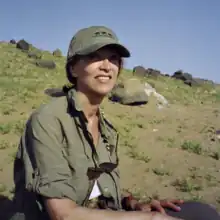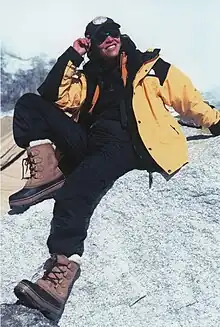Faanya Rose
Faanya Lydia (Arch) Rose (born July 9, 1938) is a British-American businesswoman, conservationist, philanthropist, and explorer.[1] She was the first woman and the first British citizen elected president of The Explorers Club.[2][3]
Faanya Rose | |
|---|---|
 Faanya Rose, New York, 2008. | |
| Born | July 9, 1938 |
| Other names | Faanya Goldin, Faanya Arch |
| Citizenship | British-American |
| Known for | First woman elected president of The Explorers Club |
| Scientific career | |
| Fields | Exploration, Philanthropy Conservation, Treasury management |
| Institutions | The Explorers Club, Fight for Sight (UK), BAA plc |
At founding in 1904, the membership of the Explorer Club was "limited absolutely to men who [had] been in the open and the wild places of the earth."[4] Women were not admitted until 1981, and would wait nineteen years before being considered for president.[5] Faanya said of her election she wanted, "Not to be the first woman president, but to be the first woman to be the best man for the job."
Birth and education
Rose was born in Johannesburg when South Africa was a dominion of Great Britain. She is the oldest child of Cecilia "Cissie" Elizabeth Arch (née Wainer) (1909–1978)[6] and Simon Arch (1910–1977), a diamond merchant and financier.[6]
She is Jewish, of Eastern European descent, her family emigrating from the Pale of Settlement in the first half of the twentieth century for South Africa. Her father left Berdychiv, Ukraine, with his family as a boy for Berlin, and when Nazism became ascendant in Germany, immigrated to Johannesburg. Her mother's family arrived in Johannesburg from the Poswol region of Lithuania.
Rose attended Johannesburg Girls Preparatory School of Barnato Park, in her time a school for young ladies.[1][7] After graduation, she enrolled at University of the Witwatersrand.[1] As an executive in London during the 1980s and 1990s, she pursued course work with the London Business School and the Association of Corporate Treasurers.[8]
Marriages and children

Rose was married in 1956 to South African Donald Goldin (1933–1979), an avid sportsman and businessman. They had three sons: Grant Joseph (born 1957), Malcolm Daniel (born 1961), and Andrew Saul (born 1972).
In 1965, Donald Goldin became general manager of the Victoria Falls Casino Hotel, and the family moved to Rhodesia. He became a naturalized Rhodesian citizen, and in the Rhodesian general election, 1977 he was elected a member of parliament, a voice in the Ian Smith government for greater black inclusion. He served less than his full term before dying at age 46 on Air Rhodesia Flight 827, a casualty of the Rhodesian Bush War.[9]
Then Faanya met Robert Rose (1921–2009) in London in the early 1990s. He was a retired American entrepreneur, world traveler, and enthusiastic explorer.[10] They married in 1993. Robert introduced his new wife to the Explorers Club by way of the club's British Chapter.[11] During her marriage to Rose, she established dual citizenship with the United States and Britain. He died at age 88.
Rhodesia
Business brought Faanya Rose to Rhodesia in 1965. Her father Simon Arch agreed to finance the first casino for the country to be built in the township of Victoria Falls. He named Donald Goldin to oversee construction and manage day-to-day operations; Faanya was a contributing partner.[12]
During her time in Rhodesia, Faanya was a witness to the collapse of minority rule. She arrived with Rhodesia's Unilateral Declaration of Independence (UDI), embraced life in the bush, withstood the privations of sanctions imposed by Britain and the United Nations in response to UDI, and weathered the horrors of the escalating guerrilla war and counterinsurgency.

The Goldins maintained two residences: one in Victoria Falls, near the casino and the seat of local government for the region, and Salisbury (now Harare), the capital and the seat of national government. They also kept a 3,400-hectare (8,400-acre) farm in the northwest bordering the Matetsi River and the Wankie Game Reserve (now Hwange National Park). Long aware of the challenges to African wildlife and the wild spaces of the continent, the Goldins adopted aggressive conservation practices to quell rampant poaching and the over-hunting of game which was decimating the big herds. Their efforts also embraced practices to impede soil erosion. In their care the farm matured to help boost the leopard population in the country and of Faanya personally planting acres of bougainvillea to retain the topsoil.
Through the 1970s, Rhodesia became more and more dangerous. In January 1980, Faanya Rose immigrated to England. In April of that year when majority rule took effect, and Rhodesia became Zimbabwe, her interests in the country were forfeit.
Business and civic involvement
Faanya Rose became a British citizen in 1983. In 1986, she became group treasurer of British property development and investment company Hammerson plc.[1] In 1988, she became group treasurer of British Airports Authority or BAA plc (now the privately held Heathrow Airport Holdings Limited), retiring from the firm in 1998. During her time at BAA she was special financial adviser to the London Ambulance Service.[1]
Rose's service to volunteer leadership has included :
- Presidency of Fight for Sight (UK)[13]
- Pema Ts'al Sakya Monastic Institute[14]
- Director emerita of the Lindbergh Foundation
- Founding trustee, Jewish Association of Business Ethics (JABE)
- Duke of Edinburgh's Award (DofE), Silver Award
- Society of American Registered Architects (New York Council), Medallion of Honor 2002
Exploration


In her twenties, Faanya was a civilian observer of Operation Noah (1958–1964), the world's largest wildlife rescue from the flooding of the Kariba Gorge by the completion of the Kariba Dam. During her years in Rhodesia (1965–1979), she went on safari to hunt and on expeditions into the bush to observe animal habitat and the terrain.[8] In 1993, she participated in an expedition to Tunisia to study the mosaics of Roman Africa sponsored by ASPROM (Association for the Study and Preservation of Roman Mosaics).[15][8] In 1994, she joined British expedition leader Colonel John Blashford-Snell of the Scientific Exploration Society (SES) on the "Great Elephant Quest" to investigate rumors that giant mammoths thought to be extinct were raiding Nepalese hunting grounds.[16]
Faanya became a member of the Explorers Club in 1994,[8] and was elected director in 1998,[17] and in 2000 by a vote of the board of directors became the first woman president.[18] Her sponsors for membership were John Blashford-Snell and past Club president John Levinson, MD (1927–2009).[8] Thor Heyerdahl, notable for his Kon-Tiki expedition, was a strong advocate for her election to the board. She is a Fellow of the Royal Geographical Society.
Her exploration résumé includes these Explorers Club Flag Expeditions:[19]
| Year | Flag # | Expedition Name | Expedition Leader |
|---|---|---|---|
| 1998 | 186[20] | Kota Moma Expedition I[21] | John Blashford-Snell |
| 1999 | 117[22] | Everest Extreme Expedition (E3) | Scott Hamilton[23] |
| 2002 | 74[24] | Humpback Whale Research Project I | Scott Hamilton |
| 2003 | 74[25] | Humpback Whale Research Project II | Scott Hamilton |
| 2007 | 162[26] | NASA Extreme Environment Mission Operation #12 | Kenneth Kamler |
| 2010 | 176[27] | Tibetan Refugee Eye & Vision Expedition[28] | Scott Hamilton |
| 2011 | 189[29] | Mount Everest High Altitude Research Expedition[30] | David Hempleman-Adams |
References
- Faanya Lydia Rose, Membership Application, 1994. Research Collections, The Explorers Club.
- "About the Explorers Club" Archived 9 December 2018 at the Wayback Machine, The Explorers Club © 2016, retrieved January 23, 2016.
- "The Explorers Club Board Elects First Woman President in Its 96-Year History" Archived 10 June 2016 at the Wayback Machine, The Free Library © 2016, April 4, 2000, retrieved April 6, 2016.
- "Explorers Now Have Their Own Club: General Greely and Others Plan Lectures on Discoveries", New York Times, November 5, 1905, p. 39, retrieved March 24, 2016.
- The vote was secret, and close, with some members threatening to resign if women were admitted. Said then president Charles F. Brush III in favor of accepting women, "It is highly bizarre to call ourself an explorers' club and exclude half the world."
- "The South African Jewish database of Jewish Migration and Genealogy"
- Faanya graduated from the original school for girls housed at Joel House, Barnato Park, which was demolished in 1962 to make way for the present campus buildings. In 1964, the institution became the co-educational Barnato Park High School.
- Membership Application, 2004.
- "59 Killed in Viscount Disaster", The Herald (Rhodesia), February 13, 1979
- Robert Harrison Rose, Membership Application, 1992. Research Collections, The Explorers Club.
- "Great Britain Chapter"
- Newsreel footage shows the prime minister visiting Victoria Falls to lay the foundation stone and Faanya's father Simon Arch presenting Mrs. Smith with a diamond brooch. Faanya is seen at the reception. "Latest Film Dispatch 1965", British Pathé, November 25, 1965, retrieved January 12, 2016.
- Formerly the British Eye Research Foundation (2004–2006), and earlier the Iris Fund for the Prevention of Blindness (1986–2004). She served all three. "About Fight for Sight"
- Faanya traveled to Nepal in 2011 for the dedication of the Faanya and Robert Rose Library benefactor. Pema Ts'al Sakya Monastic Archived 9 June 2016 at the Wayback Machine "History"
- ASPROM is the British branch of l'Étude de la Mosaïque Antique (AIEMA) established in 1978 for the study of Roman Mosaics in Britain. See "About ASPROM"
- John Blashford-Snell and Rula Lenska, Mammoth Hunt: In Search of the Giant Elephants of Nepal (London: Harper Collins Publishers, 1996), pp. 131, 139, 150, 160.
- Minutes of the Board of Directors, April 1998. Research Collections, The Explorers Club.
- "A Night to Remember", Expedition News, Volume 7, Number 4, April 2000, retrieved April 6, 2016.
- ""Carrying the Flag"". Archived from the original on 18 April 2016. Retrieved 21 May 2016.
- Flag Index 1998, Flag #186. Research Collections, The Explorers Club.
- John Blashford-Snell and Richard Snailham, Kota Moma: Retracing the Lost Trade routes of Ancient South American Peoples (London: Headline Book Publishing, 2000), pp. 27, 29, 50, 72.
- Flag Index 1999, #117.
- "Scott W. Hamilton MED '82" Archived 22 August 2016 at the Wayback Machine, The Explorers Club
- Flag Index 2002, #74.
- Flag Index 2003, #74.
- Flag Index 2007, #162.
- Flag Index 2010, #176.
- ""Flag Report 2010, #176: Tibetan Refugee Eye & Medical Project: Pokara, Nepal 2010"" (PDF). Archived from the original (PDF) on 18 April 2016. Retrieved 21 May 2016.
- Flag Index 2011, #189.
- ""Mount Everest High Altitude Research Expedition 2011 [Flag #189]: Scientific Objectives"" (PDF). Archived from the original (PDF) on 18 April 2016. Retrieved 21 May 2016.
Publications
- Goldin, Faanya & Toms, MR. "Treasury Management, The BAA Experience," Airport Forum, V. 25, No. 6 (DEC 1995): pp. 24–26. For an online abstract see TRID, the Transportation Research Board database, retrieved April 5, 2016.
- Rose, Faanya L. "Almost Swept Away." They Lived to Tell the Tale: True Stories of Modern Adventure from the Legendary Explorers Club. Edited by Jan Russell. (Guilford, CT: The Lyons Press, 2007). pp. 149–150. Google Books
- About
- Osmond-Evans, Anthony, "Faanya Lydia Rose. A Woman of Achievement." 50 Remarkable Years: The New Elizabethan Age. (Good Connections: The Beautiful Publishing Division, 2001).